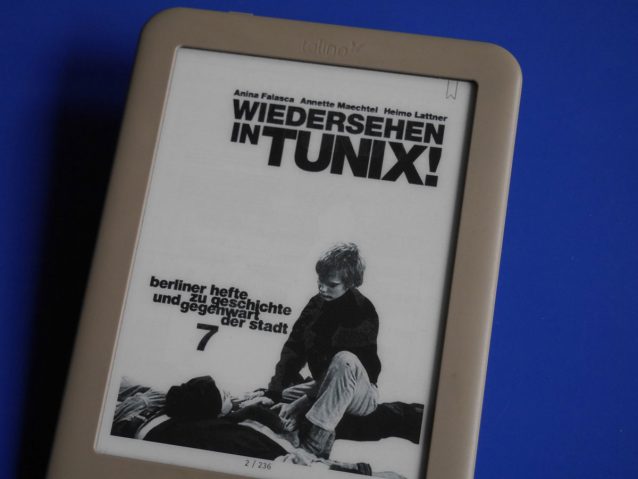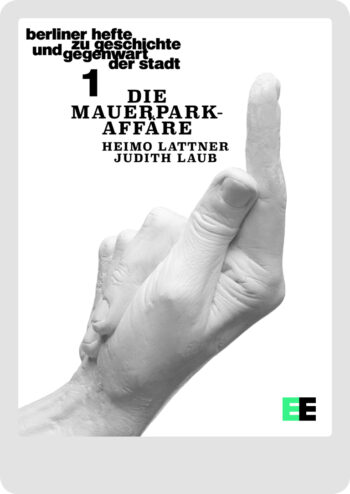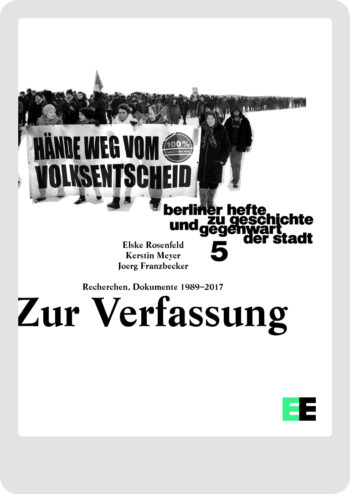Wiedersehen in TUNIX! Ein Handbuch zur Berliner Projektekultur
#7 / Beim Tunix-Kongress 1978 in Berlin entwickelte die undogmatische Linke neue Arbeits- und Projektformen
3,99 €
Beim Tunix-Kongress 1978 in Berlin entwickelte die undogmatische Linke neue Arbeits- und Projektformen. In einer Atmosphäre von Diskussion, Aktion und Party fanden lebhafte Debatten statt, u.a. zu alternativer Energiegewinnung, selbstverwalteten Jugendzentren, Neonazis in der Bundesrepublik, Feminismus und Ökologie, ‚neuer‘ Theorie aus Frankreich, zum Überleben im Stadtteil, zu linken Buchhandlungen und Kneipen.
Das Treffen in Tunix war ein Nährboden für neue Projektformen. Der Begriff des Projekts stand dabei für Vernetzung, Beweglichkeit und Selbstbestimmung. Seither hat sich der Projektbegriff verändert – das Projekt selbst ist als Arbeits- und Organisationsform zum neoliberalen Leitbild geworden. 40 Jahre nach Tunix gilt es, diese Ambivalenz zur Sprache zu bringen und die Projektepraxis auf ihre politischen Anliegen hin zu befragen.
Produziert im Rahmen von der Veranstaltung Wiedersehen in TUNIX! Eine Revision der Berliner Projektekultur, HAU Hebbel am Ufer, 2018
Annette Maechtel
Annette Maechtel lebt und arbeitet als selbständige Kuratorin, Kunst- und Kulturwissenschaftlerin und Dozentin in Berlin. Ihr Forschungsschwerpunkt beschäftigt sich explizit mit Berlin als einem politischen und diskursiven Raum. Ihr kuratorischer Ansatz ist recherchebasiert, meist kollektiv und nutzt unterschiedlichste Medien und Formate – u. a. temporäre Räume, Publikationen, Spaziergänge, Radioprogramme, aber auch institutionelle Ausstellungen.
2018 schloss sie ihre Dissertation an der HGB Leipzig ab. Seit 2017 ist sie wissenschaftliche Mitarbeiterin in dem Einstein-Forschungsvorhaben Autonomie und Funktionalisierung an der UdK Berlin, Institut für Geschichte und Theorie der Gestaltung.
Anina Falasca
Die Historikerin und Kuratorin Anina Falasca studierte Public History im Master an der Freien Universität Berlin und nahm sich den Tunix Kongress von 1978 zum Thema ihrer Masterarbeit. Sie lebt und arbeitet in Berlin und ist derzeit wissenschaftliche Volontärin beim Schwulen Museum.
Heimo Lattner
Studium an der Akademie der Bildenden Künste Wien und am Whitney Independent Study Program, NY. Mitbetreiber des Projektraums General Public Berlin (2005–2015). Seit 2015 Redaktionsmitglied der Berliner Hefte zur Geschichte und Gegenwart der Stadt und Co-Hrsg. von Ibid. – szenische Lesungen aus Dokumenten der Berliner Stadt-und Kunturpolitik. Seit 2017 Forschung zum Thema Autonomie und Funktionalisierung an der UdK Berlin. Lehrauftrag am Institut für Geschichte und Theorie an der Weißensee Kunsthochschule Berlin (2017–2018).
Hg.: Anina Falasca, Annette Maechtel, Heimo Lattner
Text: Ulrich Bröckling, Sabeth Buchmann, Birgit Eusterschulte, Anina Falasca, Christa Kamleithner, Felix Klopotek, Jana König, Stefan König, Heimo Lattner, Annette Maechtel, Sibylle Plogstedt, Sven Reichardt, Thomas Seibert, Michael Sontheimer, Julia Wigger
Bildstrecke: Stephanie Kloss
Design: Anna Voswinckel
Design E-Book: Lena Appenzeller, EECLECTIC
Deutsch
160 Seiten (pdf), 58 Abbildungen
Dezember 2018
ISBN 978-3-947295-23-4 epub (18 MB)
ISBN 978-3-947295-24-1 pdf (14 MB)
3,99 Euro
Als Buch erschienen bei: berlinerhefte.de
ISBN 978-3-946674-06-1
7,00 Euro
Das könnte dir auch gefallen …
-
Die Legende vom Sozialen Wohnungsbau
3,99 €#2 / Die Wohnungsfrage ist zurück im gesellschaftlichen Diskurs
-
Zur Verfassung. Recherchen, Dokumente 1989–2017
3,99 €#5 / Vom Zentralen Runden Tisch der DDR zum Tempelhofer Feld














